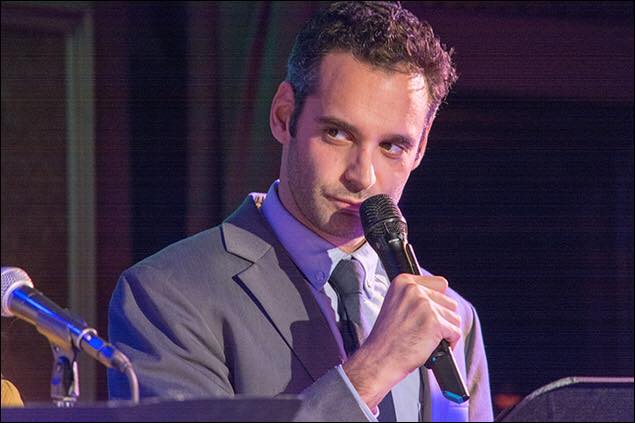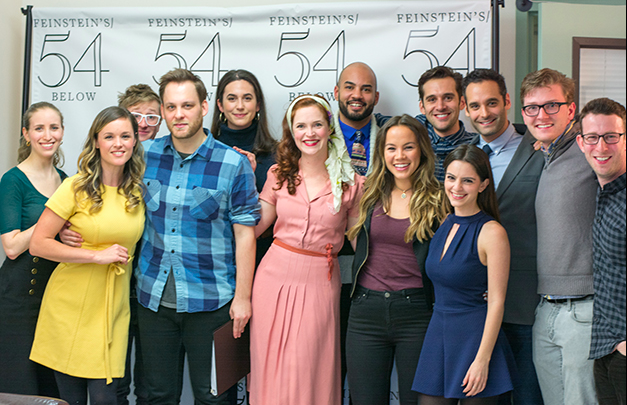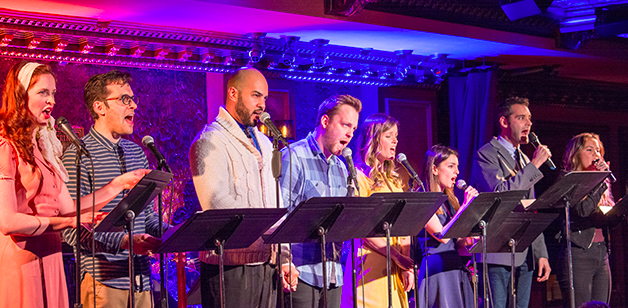“It’s an idea that Kyle had that I just was so excited about and am still,” Blaemire tells Playbill.com. “I just am constantly thinking about it. It’s basically a surrealist look at the Cuban Missile Crisis that week in 1962 when the world really could have possibly ended. The show starts with JFK giving the first televised presidential speech about the conflict, and the show is [seen] through the eyes of an 11-year-old boy who lives in Westchester, NY, who is getting this information through his parents, and they live next to a family who is reacting a bit differently to the information.
“We’re seeing the conservative and liberal views on what the President is saying and the fallibility of the presidential office. These are things that really hadn’t happened before 1962. And, over the course of the show, an affair takes place between the two households that this little 11-year-old boy witnesses. His brain just kind of breaks open, and he starts imagining the heroes of his age, of the late 1950s/early 60s…Superman and Joe DiMaggio and Marilyn Monroe and Jackie Onassis, and he starts seeing them as real people. [He] basically develops this idea that he can save the world with Superman’s guidance if he can also save his parents from breaking up their family.”
The piece, only seen before in a closed-door reading, will come to life in a concert version Feb. 9. And, with a score that spans from ’60s doo-wop (think Beach Boys) to ’60s rock (think Rolling Stones), the writers — and the audience — are getting the chance to see a more-realized version of the new musical.
Adam Chanler-Berat, who previously workshopped the piece, plays the young boy at the heart of Fallout, Michael, who takes refuge in his imagination. Characters like Superman become his hero in a time of crisis, and real-life figures such as Walter Cronkite become his imaginary friend in a time of need.
Joining Chanler-Berat are Nicholas Christopher, Grace McLean, Sara Kapner, Theo Stockman, Libby Winters, Jonathan Raviv, Elizabeth Judd and Patrick Page — talent that not only help shape the new musical but attract theatregoers to see the show in concert. The opportunity, gifted to musical theatre writers by Feinstein’s/54 Below’s director of programming Jennifer Ashley Tepper, is beneficial in getting work out into the world in a safe environment.”I think it’s a really interesting idea,” Chanler-Berat says, “and no one has really — especially in the musical theatre — written about that moment, that political moment in time and what was going on in the micro level in households and how the ripples from that event really kind of changed the shape of America.”
“The thing that we’re constantly talking about is how do you develop a show in the surplus of new shows that are popping up these days? And how do you get the right people in the room and develop it the right way without selling yourself down a future that you aren’t totally sure is right for it?” explains Blaemire, whose experience in musical theatre writing includes Glory Days, the Broadway musical that opened and closed on the same night.
Though short-lived, Blaemire previously told Playbill that he learned “a world of things” from Glory Days and that the goal for his new projects is for them “to be in awesome shape before we give them to any theatres.”
“Because it’s 54 Below,” he says, “we’re able to put together a step up from a florescent Chelsea Studios reading, which has been super cool, and this is a show that Kyle and I have been writing for, I guess, two years.”
Jarrow adds, “You go to these reading, and it’s just a piano and people singing. This show, for example, is a rock score, so the opportunity to have a real band and someone behind a mixing board, you can actually hear the songs a little bit more fully fleshed. It’s so valuable for us to learn about the show, and I also think for an audience, it’s a much more accurate version for the vision of this show than one guy on a piano.”
Though set in wartime 1962, the writers feel that Fallout is relevant to New York City 2016.
“Especially living in New York,” Jarrow says, “this feeling of like, ‘Wow, we could die tomorrow.’ There really is that palpable sense, and this period of the Cuban Missile Crisis, it was kind of the first time, I think, that Americans really felt this sense of, ‘Oh my God, there can be a nuclear war tomorrow,’ and it just seemed like a really interesting way to look at that feeling and those questions: How do you deal with that possibility? And how do you go on living? And how does that affect the choices that you make? And, as a kid, how do you process all that? And, it all feels really relevant to now.
“Something about looking at that historical period through this kid’s eyes, it just felt like a way to look at some really serious stuff that’s going on now, but because we’re framing it in the past, it makes it easier to talk about.”




